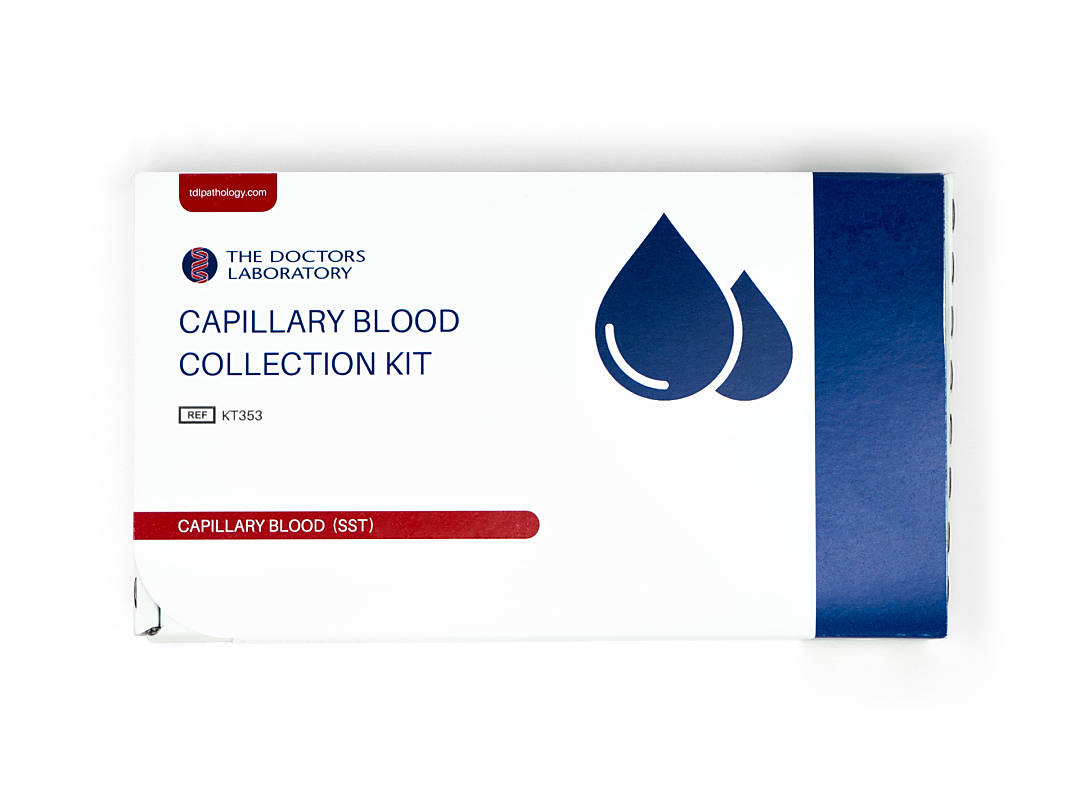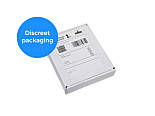HIV Test Kits
Buy an HIV test kit and get it delivered to-your-door. Collect your sample at home, post it off and receive reliable results in your account 2 to 3 days after your sample reaches our lab.






-
Order HIV test kits from Asda Online Doctor and get a convenient and comprehensive service. Doctors support you every step of the way and you can message them through your patient account whenever. Once your results are ready they will give you in-depth medical advice on what to do next.



-
-
An HIV test kit is a kit that lets you take a sample for an HIV test at home. In the case of rapid self-tests, they can also let you see results at home in 20 to 30 minutes. For other tests, samples need to be sent to a lab and processed before your results are available.
We do not offer rapid self-test kits.
-
-
There are a few different types of HIV tests:
- nucleic acid tests (sometimes called RNA or rapid diagnostic tests) which check for the virus itself in the blood and can be used to test for HIV early that other tests
- antibody tests which check for HIV antibodies in blood or saliva
- antibody and antigen tests which check for antibodies and antigens in the blood
- rapid self-tests provide results right away, either at home or in a clinic and can test for antibodies only or antigens and antibodies
- lab-based tests which involve sending a blood sample to a lab for testing and also test for either antibodies only or antigens and antibodies
Antibodies are produced by your immune system in response to an infection and antigens are part of a virus which can be used to identify it.
% of people with HIV who will test positive % of people without HIV who will test negative Rapid antibody-only test 98.1%
98.9%
Rapid antibody and antigen test 98.1%
98.9%
Lab antibody-only tests (3rd gen) 99%
99%
Lab antibody and antigen tests (4th gen) 99.7%
99.5%
-
-
The test kits we offer are 4th generation lab antibody and antigen tests. You take your sample at home and post it to our partner lab where it’s tested. The results are then displayed in your patient account with advice from one of our doctors.
What is a home rapid HIV test?
A home rapid HIV test kit is a test that can be taken at home. Unlike some home tests, home HIV tests let you take your sample and see results at home without sending a sample to a lab.
HIV self-testing can provide results within 20 or 30 minutes, but they can be a little less reliable than lab-based tests. Self-tests are between 98 and 99% accurate but Asda Online Doctor’s test kit is over 99% accurate.
What is a 4th generation HIV test?
4th generation HIV tests check for both antibodies produced in response to an HIV infection and the p24 antigens that identify the HIV virus.
This is compared to 3rd generation tests which only test for antibodies. 4th generation tests are able to detect HIV sooner after infection than 3rd generation tests. The 4th generation HIV test window period starts sooner than it does for 3rd generation tests but later that nucleic acid tests which can pick an infection earlier.
What is a 5th generation HIV test?
Similar to 4th generation tests, 5th generation HIV tests check for both antibodies and antigens but they can also identify HIV-1 and HIV-2 and check for them separately.
HIV-1 was discovered first and is more widely-spread. HIV-2 is mostly present in West Africa, grows more slowly and spreads less easily than HIV-1.
HIV RNA tests for detecting the virus at an early stage
HIV RNA tests, sometimes called nucleic acid tests, allow for early detection of an HIV infection. They can be taken within a window of about 10 to 33 days after being exposed to HIV to get accurate results.
-
-
It’s important to get tested for HIV as while it is treatable, starting treatment early is essential. It’s also important to get tested so you can avoid passing the infection on. You should get tested for HIV as soon as you can after you think you’ve been exposed.
HIV can be prevented from entering your white blood cells if antiretroviral therapy is used during the first stage of infection. HIV infections don’t always give symptoms or they are mild and easily confused with a flu. That’s why it’s important to get tested so you know your status for sure.
See our section on ‘how to test for HIV with ASDA’ for information on how to get tested for HIV.
How common is HIV in the UK?
It’s estimated that under 1 in 600 people in the UK have HIV, which makes it less common than STIs like chlamydia. However, as HIV can’t be cured, it is still relatively common.
If you’re concerned you have a different STIs like chlamydia, we can provide STI testing.
STI Number of people with the STI in 2021 Chlamydia
160,279
HIV
95,900
Gonorrhoea
54,961
Syphilis
7,543
-
-
In 2021, 91,432 people attended HIV care and it’s estimated that around 95,900 were living with HIV in the UK in 2021. This was a small increase compared to 88,786 in 2020. The number of newly diagnosed cases of HIV in the UK fell slightly from 2,961 in 2020 to 2,655 in 2021.
-
-
You should consider HIV testing if you think you have been exposed to HIV or you are having symptoms of an HIV infection. The best time to use a test kit depends on what test you’re using:
- Rapid antibody-only or antibody and antigen tests – 90 days after exposure
- Lab-based antibody-only tests – 60 days after exposure
- Lab-based antibody and antigen tests – 45 days after exposure
How soon can HIV be detected by a blood test?
Nucleic acid tests which use blood samples can accurately detect HIV as early as 10 days after infection. They look for evidence of genetic material in the blood which show that HIV is present.
[H3] How long to wait before testing for HIV
There is no minimum time you need to wait before taking an HIV test but if you test early, you will need to test again to make sure your first result was accurate.
What are the symptoms of HIV?
Not everyone gets symptoms of HIV so there may be no signs that you have been infected. When symptoms do appear, it’s usually 2 to 4 weeks after infection. This is after the virus enters the white blood cells and also when the infection progresses to acquired immunodeficiency syndrome (AIDS).
HIV symptoms in women and male HIV symptoms are fairly similar. The main difference is that there are some extra symptoms if you have a vagina, like vaginal thrush.
Right after infection
Some people do get flu-like HIV symptoms in the first 2 to 4 weeks after being infected, including:
- a raised temperature
- headaches
- muscle and joint aches and pains
- a rash
- a sore throat and painful sores around the mouth
- swollen lymph nodes, usually on the neck
- diarrhoea
- unexplained weight loss
- coughing
- sweats at night
Once the infection reaches the white blood cells
After the white blood cells are infected, symptomatic HIV can cause:
- fever
- feeling tired
- swollen lymph nodes
- diarrhoea
- unexplained weight loss
- oral thrush
- shingles
- pneumonia
Progression to AIDS
AIDS is caused by damage to the immune system by HIV. It results in infections that can cause symptoms like:
- sweating
- chills
- regular fever
- swollen lymph nodes
- regular white spots or damage in the mouth
- constant unexplained tiredness
- feeling weak
- weight loss
- rashes and bumps on the skin
-
-
-
Knowing how to test for HIV can be tricky, but testing for HIV with Asda Online Doctor is easy:
- Fill out a short questionnaire and place your order.
- Once your order is processed, your test kit will be posted to your preferred address.
- When your test arrives you can prepare your sample.
- You’ll then need to post your sample to our lab.
- Once your results are ready they will be available to view through your patient account.
Asda Online Doctor’s HIV screening service includes:
- discreet, plain packaging
- free to-your-door delivery
- comprehensive advice and follow-up care
What are the benefits of an at-home HIV test?
There are a number of benefits of using an at-home HIV test kit, including:
✓ no need for a face-to-face consultation
✓ no need to book appointments in advance
✓ no travel needed
✓ take your test whenever suits you
✓ fast results, 2 to 3 working days after the sample reaches our lab
✓ being able to message your doctor directly through your patient account
These are advantages over in-person testing, like HIV testing in a pharmacy, GP surgery or sexual health clinic
How to buy an HIV test kit online?
Buying an HIV test kit online is simple. Use a service like Asda Online Doctor:
- start an order
- fill out a short questionnaire
- log in to your account or create one if you’re new to Asda Online Doctor
- place your order and make payment
- once your order is confirmed your test kit will be dispatched
Order an HIV test kit online from us and get a secure and discreet service, including plain packaging and a free confidential delivery service.
➤ Start your order for an HIV test kit now
How to use HIV home test kits
Your home test kit will come with detailed instructions on how to use it. If you order from Asda Online Doctor you will also receive advice on using your test kit from a doctor through your patient account.
To use one of our HIV test kits:
- wash and dry your hands
- choose a finger on your non-dominant hand (your left hand if you’re right-handed and vice versa)
- take the lancet and twist off the purple stick
- place the lancet on the middle of your fingertip and press the button
- wipe away the first drop of blood that appears
- open the collection tube
- squeeze your fingertip over the tube to fill it with blood
- keep going until you reach the fill line, use more fingers if needed
- once you’ve reached the fill line, screw the lid back on the tube
- put plasters on any fingertips you used the lancet on
- write your details on the label provided and stick it on the collection tube
- put the tube in the wallet, close it and put the wallet in the prepaid envelope and seal that too
- post your sample using a convenient post box
You’ll receive your results in your patient account 2 to 3 days after your sample reaches the lab. We’ll notify you when your results are available but we won’t send the results directly to you for security reasons.
Other HIV Testing Options
You can also get tested through your regular GP or at a local sexual health clinic. You will have to attend an in-person appointment to get tested and results can take up to 7 days.
-
-
HIV home tests work in a similar way to lab tests. The test results can be ready at home or a sample can be sent to a lab and tested there. All tests check for signs of an HIV infection, like antibodies, antigens or HIV in the bloodstream.
Antibody tests
Antibody tests work by using a chemical buffer to spread the sample across a strip with antigens placed along it. As the antibodies from the HIV infection come into contact with the antigens on the strip they react and change colour to make it clear they are present.
Antigen tests
Antigen tests work in the reverse, with antibodies being used to identify the presence of a specific HIV antigen, p24. Another antibody and a dye are used to make it clear when the antigen has been picked up by the test antibodies.
Nucleic acid tests
Nucleic acid tests work by amplifying the presence of HIV genetic material using a polymerase chain reaction. This makes it clear if HIV is present and can also show how much of the virus is in the blood, showing whether or not people on treatment are infectious or not.
How accurate are HIV tests?
When taken at the right time after exposure to HIV, HIV tests are usually 98% to 100% accurate. Overall, around 0.4% of test results are false positives which means your result comes back positive but you don’t actually have an HIV infection. 0.3% or less of tests taken during the right testing window are false negatives, meaning they say there is no HIV infection when there is.
How accurate is the HIV test after 2 weeks?
“Only the nucleic acid test is reliable after 10 days of being exposed to HIV. Any tests taken earlier than the minimum number of days for an accurate result will need to be retaken once the minimum number of days has passed.” – Dr Babak Ashrafi, Clinical Lead for Service Expansion at ZAVA
-
-
If you use a home self-test you’ll need to check the results of your test yourself. If you use a lab-based test then the result will be sent to you.
Asda Online Doctor provides detailed explanations alongside test results so you understand what they mean and what your HIV status is.
Other testing services may vary in the detail they include in test results. Some may not contact you unless they are positive or send a print out of results without explanation.
How to interpret the hiv test kit results?
If your home rapid test results show no antibodies and you’ve taken it during the right window of opportunity for testing then it’s likely that you don’t have an HIV infection.
If your test kit results were sent to a lab and they come back negative and you took the test during the right window for testing then it also means you don’t have an HIV infection.
If either your rapid home test or lab HIV test results come back positive it means it’s likely you do have an HIV infection, but you’ll need to confirm it with a venous blood test at your local STI clinic.
How long do HIV test results take?
How long you have to wait for results depends on what type of test you use and what testing service you use as well:
- the rapid HIV test’s same day results can show your HIV status in 20 or 30 minutes depending on if it’s an antibody only test or an antigen and antibody test
- lab testing from Asda Online Doctor will provide results in your account 2 to 3 days after our lab receives your sample
- results times from lab testing through the NHS can vary, check your GP surgery or sexual health clinic for results time
-
-
If you do get a positive HIV test result, then it’s a good idea to take another test to make sure it’s not a false positive. To confirm your status, you’ll need to take a venous blood test at your local STI clinic
If you’ve taken multiple tests and they’re all positive ,you should consider starting treatment. You can start treatment through your local STI clinic and it’s best to do it as soon as possible. You may also need to contact any partners you’ve had sex with since you were exposed to HIV so they can get tested themselves.
What is the treatment for HIV?
Treatment for HIV involves taking antiretroviral medications which helps suppress the HIV virus and stop it damaging your immune system, including:
- emtricitabine (brand name Emtriva)
- tenofovir disoproxil (brand name Viread)
- emtricitabine and tenofovir disoproxil combined (brand name Truvada)
See aidsmap.com for a full list of antiretroviral medications.
Successful treatment can reduce the amount of virus in your blood to undetectable levels and stop you passing on the infection. Until you reach this point you will need to use condoms or your partner needs to use pre-exposure prophylaxis during sex to avoid passing on the infection.
How to get help and support if you test positive for HIV
If you test through Asda Online Doctor, our doctors will give you detailed advice on next steps and ongoing support through your patient account.
The NHS can help you find local HIV support services.
Other sources of support for living with HIV include:
What diseases can cause a false-positive HIV test?
Some aspects of your medical history can cause false positive HIV test results. The diseases that cause false positives are different based on which test you take.
Antibody-only test false positives
Causes of false positives for antibody-only tests include:
- human leukocyte antigens caused by pregnancy or blood transfusions
- taking immune globulin medication
- jaundice (yellow skin and eyes caused by liver problems)
- gammopathies (conditions that cause abnormal antibodies to appear in the blood)
- some rheumatic diseases, like arthritis, gout or crohn’s disease
Antibody and antigen test false positives
Causes of false positive antibody and antigen tests include:
- human leukocyte antigens caused by pregnancy or blood transfusions
- taking immune globulin medication
- COVID-19
- recent vaccinations, like flu or hepatitis
- liver transplants or diseases
- some cancers
- mononucleosis
- Syphilis
Nucleic acid test false positives
Causes of false positive nucleic acid tests include:
- certain gene therapies
- participating in HIV vaccine trials
-
-
What is HIV?
The human immunodeficiency virus is an infection that damages your immune system, making it harder for you to fight off infections from other diseases. It’s a viral infection so it isn’t affected by antibiotics and there are very few cases of it being cured.
What is usually the first sign of HIV?
There isn’t always an early sign of HIV infection. It can be symptomless and the first signs come when the infection has already progressed, which is why it’s important to test even when you don’t have any symptoms.
Some people do get early signs of an HIV infection. These can be flu-like symptoms, which happen in the first 2 to 4 weeks after being infected. See the section on ‘What are the symptoms of HIV?’ for more information.
How is HIV transmitted?
HIV spreads through bodily fluids and needs to come into contact with your bloodstream in order to infect you. It’s most commonly transmitted during sex, but it can also be transmitted in other ways like sharing needles.
How to prevent HIV
The prevention of HIV is easier than ever with modern pre and post-exposure medications. There are also extra HIV prevention steps you can take to help reduce your chance of being exposed to HIV in the first place.
Medication for avoiding HIV
There are medications you can take before or after sex to help avoid an HIV infection. These include taking medications similar to those used to treat HIV before sex or just after which help suppress HIV.
Pre-exposure prophylaxis (PrEP) is a medication you can take regularly or before sex to help reduce your chance of contracting HIV. It can be ordered through the NHS or an online doctor service like Asda’s.
Post-exposure prophylaxis (PEP) is a medication you can take after being exposed to HIV to avoid infection. For it to work properly, PEP needs to be taken as soon as possible. Ideally it should be taken in the first 24 hours after HIV exposure but can be taken up to 72 hours after. You can ask for PEP from your local STI clinic.
You can order PrEP online from Asda Online Doctor.
Other ways of avoiding HIV
There are a number of ways you can help reduce your chance of getting infected with HIV, including:
- encourage sexual partners to get tested for HIV regularly
- use condoms whenever you have sex, including oral sex where the virus can enter sores in the mouth
- get tested and treated for other STIs which can make contracting HIV more likely
- avoid sharing needles when injecting drugs or medication
-
Frequently asked questions
What happens when white blood cell count is high?
During an HIV infection, the number of one type of white blood cells (leukocytes) can fall. This is known as leukopenia and people with an HIV infection usually have regular blood tests to monitor white blood cell count.
A high white cell count normally means your body is fighting off an infection. During an HIV infection being told you have a high count can mean it’s not being lowered by the infection, which can mean that treatment is working.
How to test hiv at home naturally?
There is no way to ‘naturally’ test for HIV at home. HIV tests need to be done properly for them to be accurate, which means a proper test kit needs to be used for home HIV testing.
Can full blood count detect HIV?
No, a full blood count doesn’t accurately show whether you have an HIV infection or not. Full blood count tests are used once someone knows they have an HIV infection to keep track of the impact the infection is having on their health.
Can HIV be cured within 72 hours of infection?
Yes, although it’s not technically ‘curing’ the infection. If post-exposure prophylaxis is taken 72 hours after being exposed to HIV, it can reduce the chance of an HIV infection developing by stopping the virus from multiplying.

Babak studied medicine at King’s College London and graduated in 2003, having also gained a bachelor’s degree in Physiology during his time there. He completed his general practice (GP) training in East London, where he worked for a number of years as a partner at a large inner-city GP practice. He completed the Royal College of GPs membership exam in 2007.
Meet our doctorsLast reviewed: 25 Aug 2023
-
HIV statistics | Terrence Higgins Trust (tht.org.uk) [accessed 21/08/23]
-
National HIV Testing Week 2023 - House of Commons Library (parliament.uk) [accessed 21/08/23]
-
HIV Testing | WebMD [accessed 21/08/23]


GMC: 7074021

GMC: 6149061

GMC: 7085115







